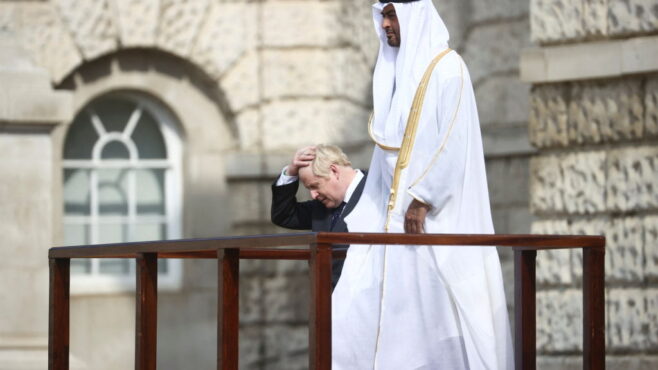
The Crown Prince of Abu Dhabi, Mohamed Bin Zayed, visited the UK in September, but can the sovereign wealth of the emirate help Prime Minister Boris Johnson with his levelling up and green plans? (Photo by Hannah McKay/Pool/AFP via Getty Images)
On Tuesday, 19 September 2021, Abdulla Bin Touq Al Marri, the United Arab Emirates’ (UAE) economy minister, led a high-level visit to the UK to deepen economic ties by seeking a comprehensive trade agreement covering trade and foreign investments. This comes off the back of a recent pledge by Mubadala, the UAE’s foreign investment fund, to invest £10bn (Dh50.2bn) in UK companies over the next five years, following the September visit of Mohamed Bin Zayed, the crown prince of Abu Dhabi, to the UK.
The energy transition, technology and infrastructure are the three areas identified as priorities for investment by the Abu Dhabi sovereign wealth fund. These are similar to the sectors of the economy identified by the UK government to drive green growth and level up less dynamic regions of the country.
How to fund a greener economy?
Funding a greener economy is already proving to be divisive, fuelling debates around carbon tax in the EU, and ideologically driven divides on the Green New Deal in the US. Additionally, the UK’s regions have lost funding provided by the European Regional Development Fund. As a result, the UK government faces the challenge of funding both regional integration and the transition to a greener economy. In September, Boris Johnson’s government raised National Insurance contributions to fund social care and planned to cut the threshold for graduate repayment of student loans to increase revenues. However, to rebuild different parts of the economy, the government should consider harnessing foreign government-driven direct investment to support its agenda of levelling up the north of England while making Britain ‘global’, without further increasing taxes.
Private sector investments will undoubtedly support government initiatives to build a more inclusive economy. They will also make economic development more viable in the long term. Indeed, Lord Gerry Grimstone, Investment Minister at the Department for International Trade, recently told a committee on foreign direct investment (FDI) that foreign-owned businesses were 69% more productive than their British counterparts. Not only do they generate a 40% turnover while only representing 4% of businesses, but they also employ as much as 16% of the UK workforce. State subsidies and initiatives help kick-start economic regeneration by absorbing initial risks, and create the confidence for further private investments, which are necessary to create jobs and long-term growth.
However, we should also be seriously considering FDI to support these purposes, alongside private sector investment. This is especially the case after the UK government pledged to reach net-zero emissions by 2050, and as a result, must propel green growth to make the UK economy carbon neutral. A prime example of how FDI can be harnessed to simultaneously promote sustainable goals but also economic growth is the recent pledge by Mubadala to invest £10bn in the UK over five years. The funding will be channelled through renewable energy projects, bolstering the energy transition and falling in line with the UK government’s green economy ambitions. Funds will also target technology and infrastructure, two sectors identified by ministers to close the gap between the northern regions and the South East of England.
Is the UK warming to greener Middle Eastern FDI?
It would appear that that ministers have caught on to this idea as they have sought to build on the UAE’s FDI move by trying to secure a multibillion-pound investment from Saudi Arabia’s Public Investment Fund, which boasts $500bn in assets, including in UK-based companies, to fund renewable energy and infrastructure projects, setting the stage for green growth.
British companies have also started partnering with state-backed companies to pioneer new activities that will be at the heart of the energy transition. For example, BP is partnering with Masdar and Adnoc, two UAE state-owned companies, to develop low-carbon hydrogen hubs and decarbonise air travel between the UK and UAE. As a result of this tri-partite investment in low-carbon hydrogen infrastructure, the hydrogen production partnership between the three companies to build low-carbon hydrogen infrastructure, Teesside could see thousands of jobs created and experience economic growth.
Although foreign state-backed investments are welcomed by the UK government as they will help close regional socio-economic disparities while building a greener economy, they remain attached to geopolitical alignments and so are subject to change. While such deep economic partnerships may benefit the country domestically and internationally, they can become vulnerabilities in the UK’s international relations.
Additionally, a report published in September by the International Trade Committee revealed that London and the South East “have captured the lion’s share” of inward foreign investment to the UK, receiving about 48% of all foreign investment since 2003. Therefore, the UK should use this opportunity presented by foreign government-driven investment to channel investment into underfunded regions that will benefit from greener and more inclusive economic development, if it is really committed to levelling up.
Receiving investments from foreign governments can support the UK government in its efforts to update the country’s creaking infrastructure without having to heavily tax the population, and make its buzzwords of ‘global Britain’ and ‘levelling up’ a reality.



